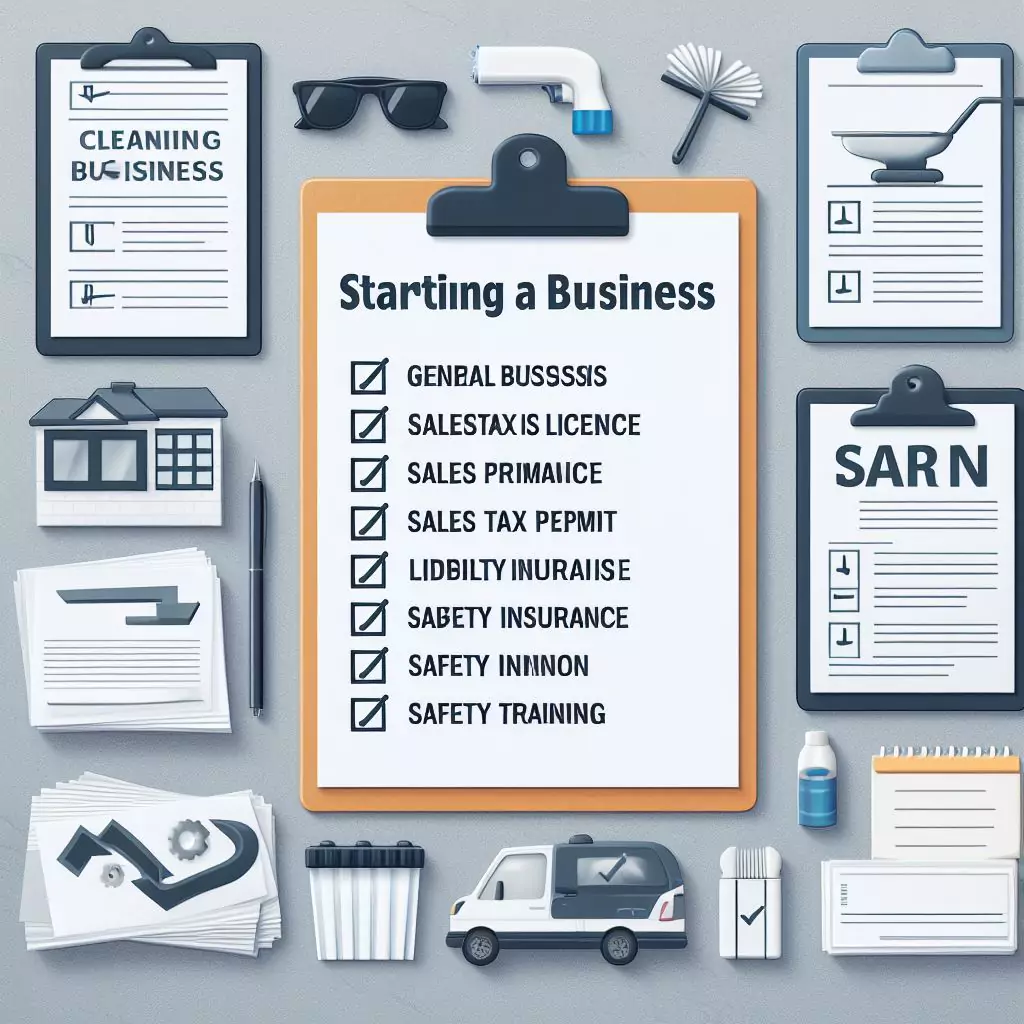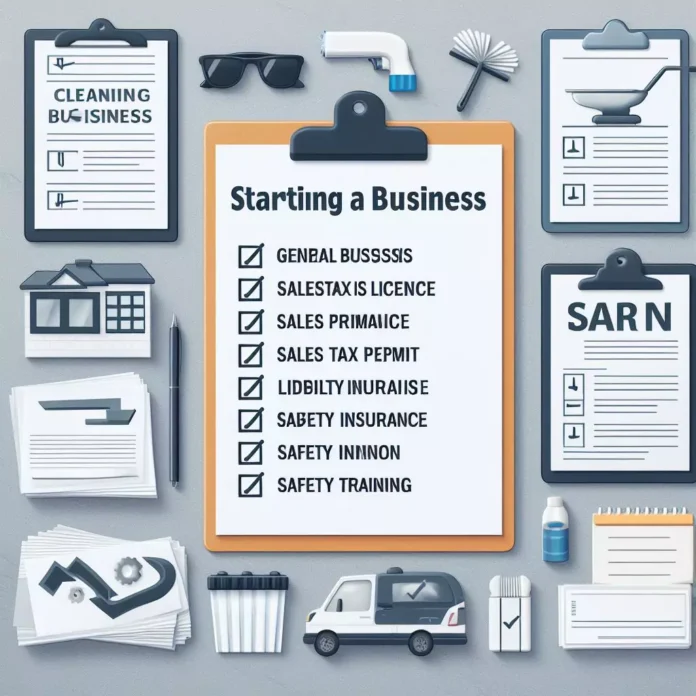Introduction: The Importance of Proper Licensing for Cleaning Businesses
Proper licensing is crucial for any business, and cleaning businesses are no exception. Obtaining the necessary licenses ensures that your business is operating legally and ethically, and it also protects both you and your clients. Without proper licensing, you run the risk of facing serious consequences, including fines, legal action, and damage to your reputation.
Operating a cleaning business without the required licenses can have severe consequences. Firstly, it is illegal and can result in hefty fines or even the closure of your business. Additionally, operating without proper licenses can damage your reputation and credibility. Clients want to work with businesses that are legitimate and trustworthy, and if they discover that you are operating without the necessary licenses, they may choose to take their business elsewhere.

Understanding the Different Types of Licenses Required for Cleaning Businesses
There are several different types of licenses that may be required for cleaning businesses, depending on your location and the specific services you offer. It is important to understand the purpose of each type of license in order to ensure that you are in compliance with all necessary regulations.
One common type of license required for cleaning businesses is a general business license. This license is typically obtained from your local government and allows you to legally operate your business within a specific jurisdiction. It ensures that you are complying with local regulations and paying any necessary fees or taxes.
In addition to a general business license, some cleaning businesses may also need specialized licenses depending on the services they offer. For example, if you offer carpet cleaning services, you may need a specialized license for handling and disposing of hazardous materials. It is important to research the specific requirements for your area to determine which licenses are necessary for your cleaning business.
State and Local Licensing Requirements for Cleaning Businesses
State and local licensing requirements for cleaning businesses can vary widely depending on where you are located. It is important to research the specific requirements for your area to ensure that you are in compliance with all necessary regulations.
For example, in some states, cleaning businesses may be required to obtain a contractor’s license. This license is typically obtained from the state’s licensing board and ensures that you have met certain qualifications and standards for operating a cleaning business.
In addition to state requirements, many local governments also have their own licensing requirements for cleaning businesses. These requirements may include obtaining a business license, registering with the local health department, or obtaining permits for certain types of services. It is important to check with your local government to determine which licenses and permits are required for your cleaning business.
Federal Licenses and Permits for Cleaning Businesses
In addition to state and local licenses, some cleaning businesses may also need to obtain federal licenses or permits. These requirements are typically related to specific services or industries and are enforced by federal agencies.
For example, if your cleaning business offers services that involve the use of pesticides or other chemicals, you may need to obtain a license from the Environmental Protection Agency (EPA). This license ensures that you are properly trained and equipped to handle and dispose of these substances safely.
Another example of a federal license that may be required for cleaning businesses is a transportation permit. If your business involves transporting hazardous materials, such as biohazard waste or medical waste, you may need to obtain a permit from the Department of Transportation (DOT).
It is important to research the specific federal requirements for your cleaning business to ensure that you are in compliance with all necessary regulations.
Insurance Requirements for Cleaning Businesses
In addition to obtaining the necessary licenses, cleaning businesses also need to have appropriate insurance coverage. Insurance protects both you and your clients in the event of accidents, damages, or other unforeseen circumstances.
One type of insurance that is typically required for cleaning businesses is general liability insurance. This insurance provides coverage for bodily injury or property damage that may occur as a result of your business operations. It protects you from financial loss if a client or third party sues you for damages.
Another type of insurance that may be required for cleaning businesses is workers’ compensation insurance. This insurance provides coverage for medical expenses and lost wages if one of your employees is injured on the job. It is typically required by law if you have employees, although the specific requirements vary by state.
It is important to consult with an insurance professional to determine which types of insurance are necessary for your cleaning business. They can help you assess your specific risks and recommend the appropriate coverage.
Obtaining a Business Tax ID Number and Sales Tax License
In addition to obtaining the necessary licenses and insurance, cleaning businesses also need to obtain a business tax ID number and sales tax license. These licenses are necessary for complying with tax regulations and ensuring that you are properly reporting and remitting any applicable taxes.
A business tax ID number, also known as an Employer Identification Number (EIN), is issued by the Internal Revenue Service (IRS). It is used to identify your business for tax purposes and is required if you have employees or if your business is structured as a partnership or corporation.
To obtain an EIN, you can apply online through the IRS website or by mail. The process is relatively simple and typically only takes a few minutes to complete.
In addition to a business tax ID number, cleaning businesses may also need to obtain a sales tax license. This license allows you to collect and remit sales tax on taxable goods or services that you provide. The specific requirements for obtaining a sales tax license vary by state, so it is important to check with your state’s department of revenue for more information.
Occupational Licenses and Certifications for Cleaning Business Employees
In addition to licensing requirements for the business itself, cleaning businesses may also have occupational licensing requirements for their employees. These licenses and certifications ensure that your employees have the necessary skills and qualifications to perform their job duties safely and effectively.
One common example of an occupational license for cleaning business employees is a certification in carpet cleaning. This certification demonstrates that your employees have completed the necessary training and have the knowledge and skills to properly clean and maintain carpets.
Another example of an occupational license that may be required for cleaning business employees is a certification in biohazard cleanup. This certification ensures that your employees are trained to handle and dispose of biohazardous materials safely, such as blood or other bodily fluids.
It is important to research the specific occupational licensing requirements for your cleaning business employees to ensure that they are in compliance with all necessary regulations.
Specialized Licenses for Cleaning Businesses, such as Hazardous Waste Removal
In addition to general licenses and certifications, some cleaning businesses may also need specialized licenses for certain types of services. These licenses ensure that you have the necessary training and qualifications to perform these specialized services safely and effectively.
One example of a specialized license that may be required for cleaning businesses is a hazardous waste removal license. This license is typically issued by the state’s environmental agency and ensures that you are properly trained and equipped to handle and dispose of hazardous waste materials.
Another example of a specialized license that may be required for cleaning businesses is a mold remediation license. This license ensures that you have the necessary training and equipment to safely remove and remediate mold from buildings.
It is important to research the specific requirements for specialized licenses in your area if you offer these types of services. Failure to obtain the necessary licenses can result in fines, legal action, or damage to your reputation.
Renewing and Maintaining Your Cleaning Business Licenses
Once you have obtained the necessary licenses for your cleaning business, it is important to stay on top of renewing and maintaining them. Failure to renew or maintain your licenses can result in fines, legal action, or the suspension or revocation of your licenses.
Most licenses have expiration dates and need to be renewed periodically. It is important to keep track of these expiration dates and submit the necessary renewal paperwork and fees in a timely manner.
In addition to renewing your licenses, it is also important to comply with any ongoing requirements or regulations associated with your licenses. For example, some licenses may require you to complete continuing education courses or maintain certain insurance coverage. It is important to stay informed about any ongoing requirements and ensure that you are in compliance at all times.
Conclusion: Staying Compliant with Licensing Requirements for a Successful Cleaning Business
In conclusion, proper licensing is essential for the success and legality of your cleaning business. Obtaining the necessary licenses ensures that you are operating legally and ethically, protects both you and your clients, and helps to build trust and credibility in the industry.
To stay compliant with licensing requirements, it is important to research and understand the specific requirements for your area. This includes obtaining the necessary state and local licenses, federal licenses and permits if applicable, and any specialized licenses or certifications required for your specific services.
In addition to obtaining the necessary licenses, it is also important to maintain and renew them as required. Failure to do so can result in serious consequences, including fines, legal action, or the closure of your business.
By staying compliant with licensing requirements and maintaining a strong reputation for professionalism and quality service, you can ensure the success and longevity of your cleaning business.


